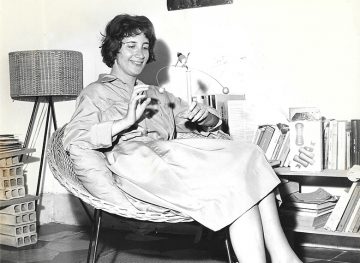Lucy Scholes at The Paris Review:
 In 1956, in a central London café, Lindsay Anderson, Karel Reisz, Tony Richardson, and Lorenza Mazzetti wrote a manifesto for what they termed the “Free Cinema” movement. Among the aims of these four young, avant-garde filmmakers was a belief in “the importance of people and the significance of the everyday.” They eschewed traditional box office appeal in favor of authentic depictions of the quotidian, particularly that of the ordinary working man and woman. Mazzetti, who died this past weekend at the age of ninety-two, was then only twenty-eight years old—she’d recently moved to England from her native Italy, and first gotten work as a potato picker. Later that year, her second film, Together—which follows two deaf-mutes through the bomb-wrecked streets of London’s East End, or as Mazzetti described it, “fields of ruins overrun by children”—would win the Prix de Recherche at Cannes Film Festival. Her first film, K (1954), “suggested by” Kafka’s Metamorphosis and made on the most shoestring of budgets while she was a student at the Slade School of Art, anticipated the Free Cinema movement, and her signature appears first on the manifesto. And yet today she’s the least commemorated of the four, and her name is often little more than a footnote to the group’s history.
In 1956, in a central London café, Lindsay Anderson, Karel Reisz, Tony Richardson, and Lorenza Mazzetti wrote a manifesto for what they termed the “Free Cinema” movement. Among the aims of these four young, avant-garde filmmakers was a belief in “the importance of people and the significance of the everyday.” They eschewed traditional box office appeal in favor of authentic depictions of the quotidian, particularly that of the ordinary working man and woman. Mazzetti, who died this past weekend at the age of ninety-two, was then only twenty-eight years old—she’d recently moved to England from her native Italy, and first gotten work as a potato picker. Later that year, her second film, Together—which follows two deaf-mutes through the bomb-wrecked streets of London’s East End, or as Mazzetti described it, “fields of ruins overrun by children”—would win the Prix de Recherche at Cannes Film Festival. Her first film, K (1954), “suggested by” Kafka’s Metamorphosis and made on the most shoestring of budgets while she was a student at the Slade School of Art, anticipated the Free Cinema movement, and her signature appears first on the manifesto. And yet today she’s the least commemorated of the four, and her name is often little more than a footnote to the group’s history.
more here.
